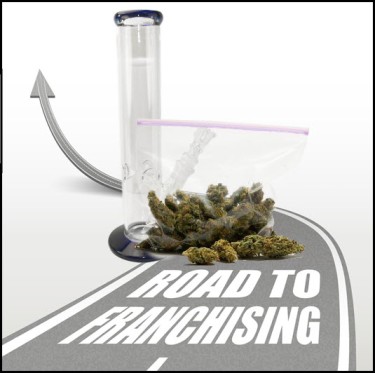
McWeed, Cannabis King, Starbongs – Franchising the Cannabis Industry
Every emerging industry is expected to adopt franchising at some point. That the cannabis industry is doing this is not surprising. In 2019, after the Franchise Times voted ONE Cannabis as the number one cannabis franchisor in the country, other cannabis franchises began to make waves – garnering widespread interest and attention while gaining greater credibility.
Today, there are dozens of licensed cannabis franchises in states where cannabis is legal. Each month the Cannabis Intelligence business base records a higher number than the last. This is all thanks to the growing number of cannabis laws being passed across North America.
The three dominant cannabis franchisors in this region are Dutch Love Cannabis with 27 stores, Cookies with 26 stores and Inner Spirit Holdings with 39 stores. Others include Uncle Sam’s Cannabis, The Peak Dispensary, ELEV8 Cannabis LLC, Curio Wellness, and Eufloria LLC.
Overview of Cannabis Franchising
The cannabis franchise system is similar to franchising in other industries. The main difference is that cannabis franchises can vary from state to state as the drugs are banned at the federal level. Franchise laws for other industries, on the other hand, are uniform across all national borders.
The various complexities of cannabis legislation are perhaps the biggest obstacle to entering the cannabis sector. The compliance rules and regulations in this sector are almost at the same level as in the arms and oil industries.
Franchising helps make a market more accessible to its customers. Dispensaries and cannabis stores, as well as the manufacturing niche of the sector, are easier to navigate once franchised. Cannabis franchising opens up numerous opportunities for operators to capitalize on. It offers new companies the opportunity to learn from existing successful companies.
Currently, the U.S. cannabis industry consists primarily of independent businesses that have yet to realize the full potential of their business.
Federal Laws and Cannabis Franchise Cannabis Franchisors and franchisees run the risk of being shut down by the FBI at any time. The Federal Trade Commission (FTC) is tasked with administering and regulating state franchise laws.
Cannabis companies cannot register with the FTC. Therefore, it is a criminal offense to deal in these franchises. However, some states have legalized the sale of cannabis and therefore allow some cannabis businesses to be franchised. Some of the requirements for a franchise are:
All three requirements must be met for a franchise business. Franchise laws are not uniform at the state level. In a state, each municipality might have different franchise laws than neighboring municipalities. Because of this, some cannabis operators prefer some states to franchising over others.
It is important to note that not all legal states have cannabis franchising laws. Only 10 out of 36 do this. For an industry already drowning in rules, regulations and restrictions, this is better than nothing.
franchises in the United States
Curio Wellness announced last year that it would be marketing its retail stores under a new identity called Far & Dotter. This new name would be registered in various states including Illinois, Virginia, Missouri, Ohio, Michigan, Massachusetts and New Jersey. Not all of these states have mandatory franchise registration requirements. Florida is the only state where they would have to officially apply to sell to franchises. CBD franchises are currently legal at the federal level, but how long will their moat last when we see full federal legalization of cannabis?
Cannabiz Media’s Cannabiz Intelligence reports that Ontario, Alberta, California and Oklahoma have the highest number of active and pending cannabis franchise licenses in all of North America. The ranking published on the website shows that Ontario currently leads with a total of 35 permits. Next is Alberta with 23 and California with 18. Washington, Manitoba and Maryland each have one, placing them at the bottom of the list.
The benefits of franchising in the cannabis industry
Franchisors and franchisees have a lot to gain in the long run. For example, franchisors would receive a ready-made solution to solve capital and labor-related expansion problems. This means the franchisor can grow their brand without wasting too much time testing and trying different strategies. This process avoids debt.
Cannabis franchising would allow hundreds of businesses to broaden their horizons during this difficult time. It would help franchisors develop big footprints in the global cannabis markets before the federal government finally legalizes cannabis. When the country finally has laws to fully decriminalize cannabis, these franchisors will more or less be the brand of choice for millions of consumers across the country.
Franchisees, on the other hand, have the opportunity to network with other cannabis companies. The feeling of being alone would disappear. These businesses and their owners would receive support, advice, working solutions and even training from their franchisors. They would only pay a set amount to access their franchisor’s assets such as their brand and registered systems. In fact, franchising helps free cannabis entrepreneurs from many risky decisions. Therefore, more time can be devoted to solving more critical tasks.
final remark
The future of franchising in the cannabis industry in the United States, Canada and even worldwide is bright and promising.
Once cannabis is decriminalized and fully decriminalized in the United States, it is inevitable that the concept of franchising will become more prominent than it currently is.
Canada has the most franchises, but it most likely won’t hold that rank once cannabis is legal in America.
The biggest challenge is finding a balance between federal and state cannabis and franchise laws to ensure franchisors can continue to spread their impact across legal cannabis states.
Note that franchising is not a cheap process. Franchisors charge royalties and marketing fees, which are usually quite high. And franchisees have other fees and taxes to pay. At the end of the first month of franchise, there is a high probability that the company will only break even. However, it gets better on the track.
CANNABIS FRANCHISES, READ THIS…

ARE YOU SIGNING UP FOR A MARIJUANA FRANCHISE DISPENSION? CLICK HERE!
OR..

IS A CANNABIS FRANCHISE A GOOD BUSINESS IDEA OR NOT?

Post a comment: